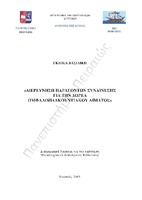Διερεύνηση παραγόντων συναίνεσης για την δωρεά ομφαλοπλακουντιακού αίματος
Investigate factors for cord blood donation concerning informed consent

View/
Subject
Δωρεά οργάνων, ιστών κλπ. -- Κοινωνικές απόψεις ; Donation of organs, tissues etc. -- Social aspects ; Tissue banks ; Human cell culture -- Social aspectsAbstract
Over the past half century, hematopoietic cell transplantation (HCT) has evolved from an idea to a well-established therapy used to treat tens of thousands of individuals annually. The first efforts at cord blood banking were initiated in the laboratory of Broxmeyer HE, where seven of the first 10 collections of cord blood that were used for allogeneic transplantation were stored. These preliminary successful results led to the institution of cord blood banks. The debate over cord blood banking has focused, until now, on scientific and bioethical issues, but has, so far, not extensively analysed parents expectations and motivations whether to incinerate their child's cord blood unit or to store it in a Cord Blood Bank. The objective of this study is to evaluate pregnant women's degree of information and the means of access to this information and how their choice of storage for therapeutic uses in a Cord Blood Bank is affected from the family and social environment. Survey Mehtodology. The main target is women during pregnancy. Participating Maternities are General Hospital "Attiko" and Genera Hospital "Elena Venizelou". It is used methodology of quantitative research to distribute 150 questionnaires of 17 closed questions, which contains three sections: 1/ an anonymous answer sheet on the participant's socio-professional profile, 2/ a technical information sheet that investigates how well informed the participants are and 3/ forming an opinion as to the decision of informed consent. The questionnaire is anonymous and it has been approved by the ethic committee of Biomedical Research Foundation. Pilot phase: led in April till June 2008, the study involved 40 pregnant women. Conclusions. This survey showed from the social - demographic characteristics of sample, the % of women that participated in the research have third degree education and four out of five live in Athens. As for the economic characteristics, it is realised that the income does not appear to practise particular role in their decision to donate cord blood. Combining consequently the two basic social - demographic parameters it appears that the education it practises more important role concerning the income in the decision-making. Four in the five (80%) declared that they have been influenced by relatives and friends. The preferable time for the briefing appears to be the last month of pregnancy as the majority (over the 50%) of the women in survey was informed for the relative processes hardly four weeks before the expected childbirth. Related - friendly environment (81%), internet (71%), the servant doctor (60%) as well as mass media (55%) are elected as the more frequent sources of briefing that influence the configuration of opinion in the donation of cord blood. However, even if the usual sources of briefing appear to constitute the mass media, according to the above elements, almost the total of (92%) sample prefers receives responsible and reliable briefing from the public banks and hardly the half of (49%) sample from the private banks respectively. The above findings present a particular interest and refer obviously in future researches of mainly qualitative character. The present research, even if it used methodology of quantitative research, nevertheless produced results that they refer in the need of deeper investigation of factors-motives that prompts the interested parts in the decision-making on cord blood donation.


